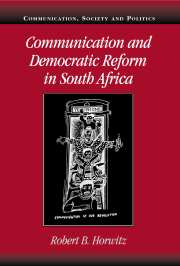Book contents
- Frontmatter
- Contents
- List of Tables
- Preface and Acknowledgments
- List of Acronyms and Abbreviations
- 1 Introduction and Overview
- 2 The Ancien Régime in the South African Communications Sector
- 3 “Sharing Power without Losing Control”: Reform Apartheid and the New Politics of Resistance
- 4 “Control Will Not Pass to Us”: The Reform Process in Broadcasting
- 5 “All Shall Call”: The Telecommunications Reform Process
- 6 Free but “Responsible”: The Battle over the Press and the Reform of the South African Communication Service
- 7 Conclusion: Black Economic Empowerment and Transformation
- Appendix
- References
- Index
7 - Conclusion: Black Economic Empowerment and Transformation
Published online by Cambridge University Press: 04 December 2009
- Frontmatter
- Contents
- List of Tables
- Preface and Acknowledgments
- List of Acronyms and Abbreviations
- 1 Introduction and Overview
- 2 The Ancien Régime in the South African Communications Sector
- 3 “Sharing Power without Losing Control”: Reform Apartheid and the New Politics of Resistance
- 4 “Control Will Not Pass to Us”: The Reform Process in Broadcasting
- 5 “All Shall Call”: The Telecommunications Reform Process
- 6 Free but “Responsible”: The Battle over the Press and the Reform of the South African Communication Service
- 7 Conclusion: Black Economic Empowerment and Transformation
- Appendix
- References
- Index
Summary
Surprisingly, a good deal of continuity can be found between the apartheid government's concrete proposals to reform the communications sector during the final years of white rule and those pursued after the ANC alliance gained access to and dominance within the policy-making arena. Several of the main recommendations of the Viljoen Task Group report on broadcasting were effectively replicated in the Independent Broadcasting Authority Act and the IBA's Triple Inquiry Report. Likewise, the 1992 study of the telecommunications sector conducted by Coopers & Lybrand for the old Department of Posts and Telecommunications looks rather like an early blueprint of the Telecommunications Act of 1996. No doubt this is in part due to the structure of (dare it be said in such old-fashioned terms) the objective conditions and forces shaping events in the communications sector and to the limited number of reasonable reform options. Largely irrespective of their apartheid pedigree, bloated and debt-ridden state-owned and -operated South African monopoly enterprises in both broadcasting and telecommunications faced market and technological conditions that had begun to erode their monopoly control. Would-be competitors, both domestic and international, were poised at the ready to take advantage of this erosion. This predicament has affected virtually all broadcast and telecommunications monopolies worldwide in recent years. Some accommodation of the erosion of monopoly and the reality of competition was virtually inevitable.
- Type
- Chapter
- Information
- Communication and Democratic Reform in South Africa , pp. 323 - 356Publisher: Cambridge University PressPrint publication year: 2001



